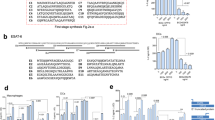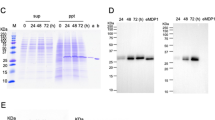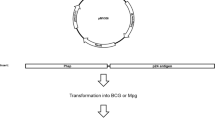Abstract
Epstein-Barr virus infection is strongly associated with a number of malignancies. The EBV latent membrane protein 2A has been implicated as one of the most attractive candidates for immunotherapy of related malignancies. In previous studies, the T cell epitopes of LMP2A have been identified systematically. However, the epitope-based vaccine generally meets inefficient immunogenicity when used in vivo directly, which could be overcome by combination with appropriate adjuvants. Heat shock protein is a natural chaperon, which is able to activate the classical major histocompatibility complex class I antigen-processing pathway (cross-presentation). In this study, a minigene encoding LMP2A356–364 (FLYALALLL) was genetically fused to the carboxy-terminal of mycobacterial heat shock protein 70. The epitope fusion protein was expressed and purified, and the cross-presentation of LMP2A356–364 by monocyte-derived dendritic cells pulsed with the epitope fusion protein was evaluated. Results showed that the epitope fusion protein-pulsed mDCs were much more efficient than the single peptide-pulsed mDCs on CTL activation. Immunization of HLA-A2.1 transgenic mice with MtHsp70-LMP2A356–364 generated peptide specific CTL more effectively than a single peptide plus incomplete Freund's adjuvant (IFA). Growth of LMP2A expressing B16 melanoma tumor cells was suppressed in the vaccinated groups. Our results suggested that MtHsp70-LMP2A356–364 fusion protein was more effective than the CD8+ T cell epitope alone on anti-tumor immunity. As a result, the MtHsp70-LMP2A356–364 fusion protein is considered to be a promising candidate vaccine for EBV related malignancies.
This is a preview of subscription content, access via your institution
Access options
Subscribe to this journal
Receive 12 digital issues and online access to articles
$119.00 per year
only $9.92 per issue
Buy this article
- Purchase on Springer Link
- Instant access to full article PDF
Prices may be subject to local taxes which are calculated during checkout
Similar content being viewed by others
Author information
Authors and Affiliations
Corresponding author
Rights and permissions
About this article
Cite this article
Liu, G., Yao, K., Wang, B. et al. Immunotherapy of Epstein-Barr Virus Associated Malignancies Using Mycobacterial HSP70 and LMP2A356–364 Epitope Fusion Protein. Cell Mol Immunol 6, 423–431 (2009). https://doi.org/10.1038/cmi.2009.54
Received:
Accepted:
Issue Date:
DOI: https://doi.org/10.1038/cmi.2009.54
Keywords
This article is cited by
-
Efficient induction of a Her2-specific anti-tumor response by dendritic cells pulsed with a Hsp70L1–Her2341–456 fusion protein
Cellular & Molecular Immunology (2011)
-
Rebalancing Immune Specificity and Function in Cancer by T-Cell Receptor Gene Therapy
Archivum Immunologiae et Therapiae Experimentalis (2010)



